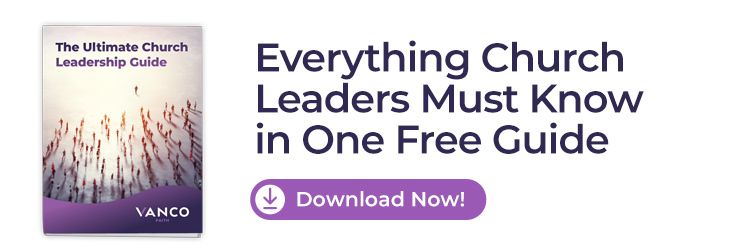
As a church leader, your journey can be confusing at times. A clear answer isn’t always right in front of you — or is it? As busy as we can become in modern day life, when managing the day-to-day needs of our churches, sometimes it’s important to go back to the basics to ensure that we are godly church leaders. To do that, it’s important to think about what Scripture says. That’s why we’re exploring Scripture for insights about church leadership.
Table of Contents
- The Importance of Scripture in Guiding Church Leadership
- Biblical Foundations of Church Leadership
- Qualities of a Good Church Leader According to the Bible
- Roles and Responsibilities in Church Leadership
- Challenges in Church Leadership and Biblical Solution
- Key Takeaways
- FAQs
The Importance of Scripture in Guiding Church Leadership
When we consult Scripture about church leadership, we’re going back to the shared beliefs that bring us together in faith. For churches, this is often vital. It’s important to find ways to align our practices with our shared beliefs as we aim to strengthen our faith communities. Consulting Scripture is about more than just seeing what the Bible says — it’s also about ensuring that we honor the teachings of our faith in all of our decision-making.
Biblical Foundations of Church Leadership

In Christianity, church leadership has existed for millennia. Early church leaders faced challenges that were in many ways distinct from our own but can still lend us some perspective as we work to strengthen our communities. When we follow this pattern of church leadership, we can often find ways to apply it to modern day church administration.
Key Scripture in Church Leadership
Scripture about church leadership can provide us with a wealth of examples to follow and important anecdotes to consider. Among these, key figures can be particularly important. We can observe leadership models from early examples in Scripture — figures who act as exemplars for church leaders, even today.
For example, Moses can serve as a particularly powerful embodiment of patient leadership in the face of waning faith — something that many church leaders face today. St. Peter, who first denied Jesus three times before repenting, is often seen as an exemplar of resilience and humility. Similarly, St. Paul is an example of the power of transformation through faith — reminding us that we all make mistakes and can be saved.
Qualities of a Good Church Leader According to the Bible
Importantly, when we consult Scripture, we can identify important patterns in leadership — key attributes that have made effective and faithful leaders over time. These leadership qualities can be important to think about, as we can often find ways to model our own decision-making and behavior as church leaders on these attributes.
Qualities of a Good Church Leader
When we look at Scripture, what qualities can we observe as indicators of strong leadership? Many! For example, in leaders like Moses, we can observe a high degree of wisdom, patience and humility. Despite being faced with waning faith, Moses demonstrated how to exercise authority, but was strong enough to avoid abuse of authority. This is an important quality for church leaders, who must make difficult decisions. Another vital characteristic — that of servant leadership — is seen clearly in the transformation of St. Peter, who after his repentance became an exemplar of unconditional servitude to God. We observe another crucial quality, humility, clearly in the example of St. Paul, who faced the mistakes he made.
Roles and Responsibilities in Church Leadership

There are many church leadership roles and responsibilities. Ministry can take numerous forms, and there are various individuals who carry out a range of important responsibilities in churches — many of whom are exemplified in Scripture.
Roles and Responsibilities
Some primary leadership responsibilities in churches might include those of teachers and pastors. Another important role found in Scripture and in churches today is that of evangelists — those called to spread the Word of God — and deacons, often tasked with pragmatically attending to matters of the church.
Challenges in Church Leadership and Biblical Solutions
While biblical teachings may sometimes seem far removed from modern society, the truth is that we share many challenges today that align with those faced by leaders of the past. Sometimes, consulting Scripture can be highly insightful.
Common Leadership Challenges in Modern Churches
In modern churches, we can face a number of challenges — such as ensuring that we adhere to our doctrines of faith, dealing with conflict within the church and even preparing the church for its next generation of leaders. When we look to Scripture, we can find a wealth of wisdom to help guide our paths forward.
Key Takeaways: Applying Scriptural Wisdom to Modern Church Leadership

While modern day church leadership can be complex, nuanced and sometimes challenging, it’s often helpful to go back to the basics of our faith. When we consult Scripture, we often find that the challenges we face today are not so different from those faced by leaders in the Bible. Early leaders such as Moses, St. Paul and St. Peter provide us with important examples. The qualities that these influential figures in Scripture demonstrated are still necessary and important for churches today. When church leadership feels confusing and daunting, remember that Scripture is there to guide us and to help us reflect on our own spiritual gifts and how to use them during our leadership journeys.
FAQs
Q: What role do church leaders play in the spiritual growth of the community?
A vital one. When the members of our congregations are lost, they often turn to leaders for help. But they don’t always ask; often as church leaders, we teach by example, just as early church leaders once did. By embracing the qualities that Scripture tells us are important, like humility, grace, patience and wisdom, we’re often better able to set a positive example for our congregations.
Q: How can church leaders balance spiritual and administrative responsibilities?
These responsibilities aren’t mutually exclusive. As we learn from St. Peter, everything we do as church leaders should be in service of God. As a church leader, administrative responsibilities are a necessary part of positioning your church for the future.
Q: Can Scripture guide church financial management?
In many ways, Scripture can guide church financial management. While it’s important to consult with financial experts and adhere to modern day regulations and ethical standards, many early church leaders serve as examples of pragmatic leaders who led their churches through shifting societies.
Q: How can church leaders foster a servant leadership culture?
To foster a servant leadership culture in a church, church leaders can:
- Lead by Example: Demonstrate servant leadership through their actions.
- Incorporate Teaching: Regularly discuss servant leadership in sermons and teachings.
- Empower Members: Give congregation members opportunities to lead and serve.
- Organize Service Activities: Provide practical opportunities for serving the community.
- Promote Listening and Empathy: Create an environment where everyone feels heard and valued.
- Encourage Reflection: Facilitate self-reflection on service and leadership.
- Recognize Service: Acknowledge and appreciate acts of service.
- Cultivate Humility and Gratitude: Encourage a culture that values humility over status.
- Offer Training: Provide resources and training on servant leadership.
- Build Strong Relationships: Focus on creating a connected and supportive community.
By taking these steps, church leaders can create a culture where servant leadership is practiced and valued.
Q: How does Scripture guide decision-making in church leadership?
In many ways and for each church it may be different, but it’s helpful to consider the qualities that were important early in the church and how the examples in Scripture can help guide our decision-making.
Get Everything Church Leaders Must Know in One Free Guide
Get the tested church leadership strategies and techniques used by top ministries to build healthy and growing congregations. Download our free eBook to learn…
- What to avoid.
- How to set SMART goals.
- Leadership model structures to inspire your church leadership strategy.
- How to recruit volunteers and delegate.
- How to handle challenging situations such as disgruntled church members or staff.
- How to be a good financial steward for your church.
- And more!










